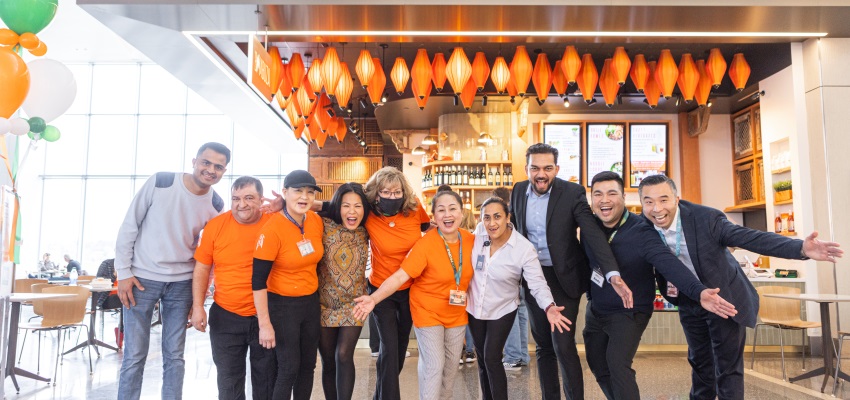Bambuza Hospitality group grows by giving back

The team at one of the Bambuza Vietnam Kitchen & Bar restaurants at PDX Airport in Portland, Ore. Photo courtesy of Kitta Bodmer Photography
As children of immigrants who found their livelihood and connection to their community in food, Bambuza founders and co-owners Daniel Nguyen and Katherine Lam knew how important it is to “pay it forward.” From their beginnings in 2003 with Bambuza Vietnam Bistro, the pair have focused on the core values of stewardship, integrity and community. Both are exceptionally active in the community and hold public service posts in addition to running their company.
The Bambuza concept grew from the experience of family meals in their household. “In our kitchen at home,” Nguyen says, “Mama Lan’s family recipes called for less standing around and more doing. We knew that this shared experience of preparing and eating delicious food was what we wanted to share with our community as well.”
As the restaurant took shape and the menu ingredients evolved, the co-founders’ vision remained true—make a positive difference in the lives of friends, family and crew. “We promote sustainability by sourcing local, fresh ingredients,” Lam says, “and we cook from the heart, so quality matters. And we wouldn’t be here without the support of the community, so we want to give back and pay it forward for future generations by supporting local community causes and schools.”
From one original store in Seattle, Bambuza Hospitality Group has grown to four Bambuza Vietnam Kitchen & Bar units, including two in the Portland Airport and one in the Seattle-Tacoma Airport; four Coffee Bean & Tea Leaf units, three of which are in the John Wayne Airport in Orange County, Calif.; and the soon-to-be-opened Ninth & Pike Artisan Deli in the Sea-Tac Airport international terminal and Hiêp Húng, an Asian marketplace in Clackamas, Ore. The company operates out of a 7,500 sq. ft. facility in Portland’s warehouse district that contains a commissary producing all the chain’s sauces, marinades and seasoned meats.
We asked how both American tastes and Asian-American food has evolved, and what the company did to weather the pandemic.
How has Asian cuisine in America matured since Bambuza opened in 2003?
DN/KL: People have been paying more attention to the culture behind our dishes. For us, we see Vietnamese cuisine emerging in the mainstream, pioneered by our parents who laid the foundation for their kids to elevate that concept and take it to the next level. We at Bambuza are proud that we have expanded into spaces like PDX and SEA-TAC International Airports, that were once dominated by big chains. It’s been remarkable to see greater acceptance and appreciation for our traditional meals showcased on such a large scale.
How has the American consumer’s relationship with Asian cuisine changed?
DN/KL: There has certainly been a shift to de-homogenize Asian cuisine—and all ethnic cuisine—over the decades. Today, we believe consumers are now attuned to the differences between Asian cultures and their cuisines. Technology certainly has had a major impact on the accessibility of Asian cuisine. This is reflected in 3rd-party delivery services where someone can search for something very specific to their appetite. Of course, the shift in the American demographic is another key indicator to look at. We live in a more connected world than any other generation. In our experience, many immigrants and refugee families search for stores and shops that connect them with their heritage.
Are the offerings today more authentic, more representative of the myriad cultures of Asia?
DN/KL: Our country is a blend of so many cultures, so it’s natural to see cuisine evolve over time and that’s why it’s exciting to see different interpretations based on our lived experiences. I think that’s what makes Asian and Asian-American cuisine authentic. For many restaurant visionaries, crafting food has become an expression and a reflection of who we are.
What are the future trends for Asian cuisine in the U.S.?
DN/KL: Asian cuisine has become a very fun experience for foodies in the United States. It’s diverse in richness and taste, but it’s truly centered around sharing. Asian cuisine is really friendly for those with a healthy lifestyle. We believe that the cuisine also accommodates those who have dietary restrictions, and we are proud to have options available for everyone.
Despite the downturn of the past two years operating under COVID-19, did anything good come out of how you adapted to conditions?
DN/KL: The shock of the pandemic was a surreal moment for our family company. The veil of uncertainty cast a dark mood globally. For us at Bambuza, we knew that adapting would be a Herculean challenge. To meet it, we turned to our company mission—to be of service to our communities. Many households were hurting at the height of the pandemic, and as children of refugees, we were especially motivated by our parents’ spirit to keep pushing forward. Extending our compassion ended up connecting us even more closely to our neighbors than before.
Photo of Bambuza team courtesy of Kitta Bodmer Photography